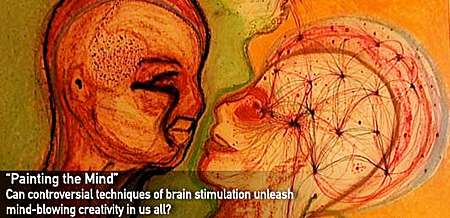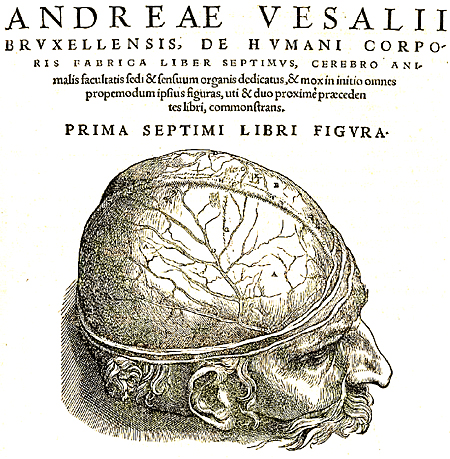Alcmaeon of Croton, a natural philosopher in 450 BC, concluded, based on his animal dissections, that the brain, not the heart, is the central organ of sensation and thought. However, a couple of centuries later, someone then articulated the idea that the seat of mental function resides in the ventricles of the brain – cavities filled with cerebrospinal fluid. Galen, the famous physician at the Roman Imperial Court in 170 BC, popularized this idea further in his extensive writings that were eagerly read throughout the dark Middle Ages.
The great Renaissance artist Leonardo da Vinci still held on to this ancient belief that the senso commune (sense of community), phantasy and imagination originated in the anterior ventricle; that the middle ventricle served cognition; and that memory was contained in the posterior ventricle.

We owe it to Andreas Vesalius to dispute the theory that higher brain function resides in the ventricles. Vesalius was headed for Art school but then, apparently, yielding to family pressure, he entered Med school. Breaking with the medieval tradition of bowing to Galen’s authority, Vesalius believed in hands-on direct observation. He carried on his own dissection on humans and published his findings in a textbook ‘humani corporis fabrica’.
Supposedly, the popularity of the ventricle theory had to do with the following reasoning: Because the soul resides in the head and the soul is incorporeal, therefore, its locus has to be in the brain cavities filled with fluid rather than in the surrounding brain tissue (solid and eatable). Of course, this thinking mixes up Mind and Soul.
A couple of centuries later, dissatisfied with purely biological explanations, Rene Descartes, the great mathematician, articulates the theory of dualism, mind – body dichotomy. He distinguished between the ‘brain’ and the ‘mind’, arguing that the brain organizes animal behavior while the mind contains a person’s thoughts, desires, soul.
 copied from the web .
copied from the web .
This belief in mind-body dichotomy persists into the present. A couple of years ago, I quit the class of a local Yoga teacher, Ruth Fisk, a disciple of the famous Iyengar, when she disturbed my ‘Peace of Mind’ voicing that the BRAIN is there to remember telephone numbers while the MIND…..
I don’t pretend to know any answers to these issues.
However, I do believe in evolution. While Descartes argued that animals were just machines, I embrace Darwin’s thoughts, 1872, on the expression of Emotions in Man and Animals.
What are your thoughts on this subject?


Birgit,
I am simply delighted that these questions are still open — that there are mysteries to be unveiled, behind which, I’m sure, there are more mysteries. I’m a rationalist who thinks we (the human race) could be a bit more humble about what we’ve actually been able to understand.
I lean toward a kind of holism (brain/mind/body inextricably intertwined) but am certain that we don’t understand the way that they are intertwined. And that this will provide for a lot of fascinating research that people like yourself will be doing, perhaps for as long as such research is continued.
Oh, and what are those 1872/Darwin thoughts on Emotions in Man and Animals? I’m not familiar with those particular ideas.
And how foolish of Darwin not to include Man (women, too!) as one of the Animals.
June,
I, too, lean towards the idea that brain/mind/body are intertwined, having spent a sabbatical in Candace Pert’s NIH lab, where, a long time ago, I studied ‘Molecules of Emotion’ in the limbic system of the brain and learned that immune cells respond to the same peptides.
Supposedly, Rene Descartes’ notion that animals are simply machines without feelings led to animal vivisections without killing their pain with anesthetics. As I understand, from reading secondary sources, Darwin rectified this way of thinking by telling 19th century people that both humans and animals have emotions.
Birgit:
Are peptides analogous in some oceanic sense to the long-sought fountain of youth? I can imagine elders crowding the beaches of Florida and elsewhere, the better to bathe in the rejuvenating pep tides.
What would be your take on the relationship between a computer and a computer program?
Rudolph Steiner was no help.
Jay,
I don’t know about getting endorphin release from lying on a beach in Florida. In snowy Michigan, I am more likely to experience it while cross country skiing.
About computers, ask Steve, our artificial intelligence expert.
June, your holism goes only half-way. I believe the mind is not only embodied–the body is inextricably tied to our cognition–it is also “emworlded,” by which I mean that the nature of the world (as known through the senses) plays an essential role in brain development. This is very well-established in the area of visual perception, and less well but convincingly in the area of language learning. If not exposed to spoken language in the first six years or so while the brain is approaching maturity, humans are incapable of learning it later. Mind/brain, software/computer, language/words, music/tones…what creation is without a vehicle, a medium?
Steve,
“Emworlded” — yes!
In the series I’ve been doing on my old home grounds, from photographs of the territory, I’ve been reintroduced to emotions and visions that I never had language for before — that is, visual language, paint that could approximate something of the feelings I had for what I saw. As a child, I simply had no exposure to visual knowledge, other than what I made up. Music, yes, poetry, yes, but we had no (visual) art books, no (visual) art lessons, no art interest available, either in the family or in school. So to see the world of my childhood, now that I have such tools as viridian and burnt umber, available to me is something miraculous.
This doesn’t deny your point about spoken language, by the way; I spent enough time gazing, trying to understand, to comprehend, to fix, those views of Pine Creek and the mists/greens/waters that the visions remained with me all these years and were only recently unlocked by the tools. So I was “emworlded” so strongly that 60 years later, the world I was immersed in still glows in my brain/mind/body.
Folks:
I have a mind to raid the fridge. “My” elbow, “my” knee, “my” perception, “my” propensity… it’s like there is a possessor-in-keeping of all aspects of this being. Semantics? Maybe: but there are so many ways to be self-referential without invoking a possessive. Thoroughgoing agnostic as I am, I can still entertain the notion that the overall franchise that comprises this writer takes up a lot more room than my given cubic meter, and the center of identity lies elsewhere. All this while awaiting news that the “sense of self” has been has been successfully and reproducibly identified.